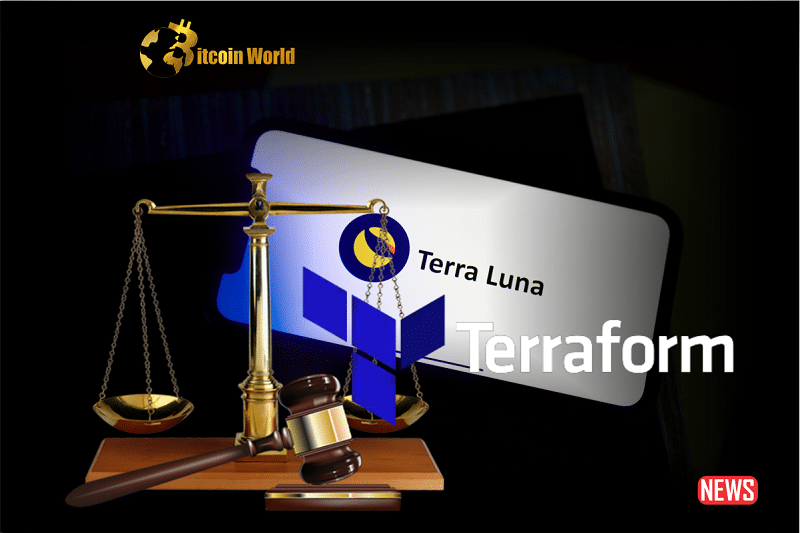The rollercoaster ride of cryptocurrency continues, and the latest twist involves Terraform Labs, the company behind the infamous Terra/Luna ecosystem collapse. Remember that dramatic wipeout that shook the crypto world? Well, the legal aftermath is still unfolding, and Terraform Labs is now fighting tooth and nail to dismiss a significant class action lawsuit. Their argument? That since their protocols were cooked up outside the US, American securities laws shouldn’t apply. Let’s dive into the details of this high-stakes legal showdown.
The Legal Battlefield: A California Courtroom
At the heart of the matter is a federal court in California, where Terraform Labs has formally requested the dismissal of an investor lawsuit spearheaded by Nick Patterson. Patterson’s claim is that Terraform Labs essentially issued unregistered securities and misled investors – serious allegations, to say the least.
Terraform’s Defense: ‘Made Abroad, Not Our Problem?’
Terraform Labs, backed by legal eagles from Dentons, is taking a bold stance. Their core argument boils down to this: the federal securities laws cited in the lawsuit are irrelevant because the technology behind Terra and Luna was developed and implemented outside the territorial bounds of the United States. Think of it like saying, ‘We built it over there, so US rules don’t apply here.’ This raises some interesting questions about the global nature of crypto and the reach of national laws.
Key Points of Terraform’s Argument:
- Foreign Development: They assert the core protocols were designed and launched outside the US.
- Domestic Application Limits: They argue that US securities laws are primarily intended for domestic activities.
- Lack of Domestic Injury Proof: They claim the plaintiff hasn’t sufficiently proven that the alleged mail and wire fraud occurred within the US.
- Digital Wallet Location: Terraform points out that the plaintiff didn’t specify where their digital wallets holding the Terra tokens were located, weakening claims of domestic harm.
The Plaintiff’s Perspective: Did Investors Get Hurt on US Soil?
While Terraform is focusing on the geographical origin of their technology, the plaintiffs, representing a class of investors, are likely arguing that the impact of the Terra/Luna collapse was very much felt within the United States. Investors based in the US lost significant amounts of money, and they’re arguing that Terraform should be held accountable under US law for the alleged securities violations and deceptive practices.
More Than Just One Lawsuit: A Web of Legal Challenges
This class action lawsuit isn’t happening in a vacuum. Terraform Labs and its founder, Do Kwon, are facing legal battles on multiple fronts. Let’s take a look:
- SEC Action: The Securities and Exchange Commission (SEC) filed its own lawsuit against Terraform and Do Kwon in February, accusing them of orchestrating a multibillion-dollar securities fraud. This highlights the US regulatory interest in the matter.
- South Korean Ruling: Interestingly, a South Korean court ruled in April that LUNA doesn’t qualify as a security under South Korean law. This demonstrates the varying legal interpretations of cryptocurrencies across different jurisdictions.
- Criminal Charges in South Korea: Adding another layer of complexity, Terraform Labs co-founder Hyun-seong Shin and several others have been indicted in South Korea on charges including fraud, breach of trust, and embezzlement.
What Does This Mean for the Future of Crypto Regulation?
This legal battle raises crucial questions about how regulations should apply to the increasingly global and decentralized world of cryptocurrency. Can companies operating internationally simply sidestep national laws by claiming their development happened elsewhere? The outcome of this case could have significant implications for how securities laws are interpreted and enforced in the digital asset space.
Key Questions to Consider:
- Jurisdictional Reach: How far do national securities laws extend in the context of borderless technologies?
- Investor Protection: How can investors be protected when dealing with globally operated crypto projects?
- International Cooperation: Will we see more collaboration between countries in regulating the cryptocurrency space?
Looking Ahead: A Decision That Could Set a Precedent
The federal court’s decision on Terraform Labs’ motion to dismiss will be closely watched by the crypto industry and legal experts alike. It could set a precedent for how similar cases involving foreign-developed crypto protocols are handled in the future. Will the court side with Terraform’s argument about the geographical limitations of US securities laws, or will it prioritize the protection of US-based investors who suffered losses? Only time will tell.
In Conclusion: The Global Crypto Legal Maze
The Terraform Labs case perfectly illustrates the complex legal landscape surrounding cryptocurrencies. As digital assets transcend borders, the challenge for regulators and courts is to adapt traditional legal frameworks to this new reality. The outcome of this lawsuit could significantly impact the future of cross-border crypto regulation and the responsibilities of companies operating in this space. It’s a reminder that while the technology may be innovative and global, the legal ramifications are still being navigated, and the journey is far from over.
Disclaimer: The information provided is not trading advice, Bitcoinworld.co.in holds no liability for any investments made based on the information provided on this page. We strongly recommend independent research and/or consultation with a qualified professional before making any investment decisions.


